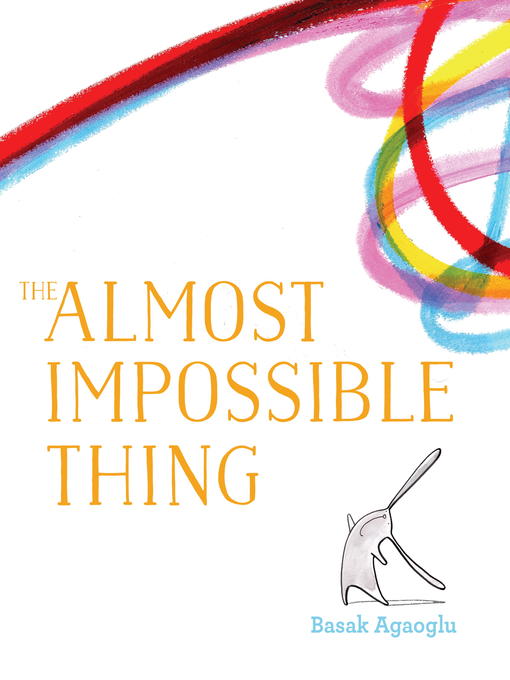
The Almost Impossible Thing
فرمت کتاب
ebook
تاریخ انتشار
2017
Lexile Score
340
Reading Level
1
نویسنده
Basak Agaogluشابک
9780399548291
کتاب های مرتبط
- اطلاعات
- نقد و بررسی
- دیدگاه کاربران
نقد و بررسی

February 6, 2017
Agaoglu’s debut children’s book is an extended metaphor for the way ideas come into being. “Once upon a time there was a dream,” she starts, “a dream that tried to take shape.” Graceful mixed-media pictures show a rabbit with skinny ears who sees a bird circle overhead. The rabbit longs to fly (fittingly, its ears sometimes appear outstretched like the wings of a bird or plane), and it begins to plan a flying machine, covering a wall with notes and a blackboard with sketches. “The dream didn’t know that it had no shape,” Agaoglu continues, focusing on the dream’s cloudy, uncertain state. “Unless it was kept in a tiny box.” The rabbit’s early attempts to fly fall flat, but the dream wants to become real and, at last, it does: “The power of that dream turned its box into... a rocket ship that flew into the light.” Readers see the rabbit and his friends form a giant rabbit flying machine that takes to the air in brilliant hues. Although the rabbit’s persistence is certainly on display, Agaoglu suggests that some dreams are so powerful that they almost will themselves into fruition. Ages 3–7.

March 15, 2017
A bunny sees a bird--and a seemingly silly notion takes hold, stubbornly survives setbacks, and pushes and pulls its way into something real.The illustrations, made from block prints and a simply inked animal cast that features rabbits with long, propellerlike ears, add the plotline to Agaoglu's terse and abstract narrative: -Once upon a time there was a dream, / a dream that tried to take shape.- Said dream begins as a sketch-filled wall and chalkboard and continues through failed experiments involving a trampoline and other aids. After being put away in a -tiny box- but being -too alive to sit in one place,- the dream culminates at last in a multibunny construct that -flew into the light. And sparkled with every color that people could see. / And even a few that they couldn't.- That final line isn't the only one that will leave readers scratching their heads. Still, in contrast to such stories as Kobi Yamada's What Do You Do with an Idea? (illustrated by Mae Besom, 2014) that offer more concrete--and therefore, perhaps, limiting--visualizations of what a dream looks like, the allusive language and imagery here open the concept to more universal possibilities. Even if the text is hard to pin down, the images offer much to consider and chuckle at, from bunnies on ski jumps and with hang gliders to the final, improbable result. A difficult but rewarding debut. (Picture book. 7-10)
COPYRIGHT(2017) Kirkus Reviews, ALL RIGHTS RESERVED.

May 1, 2017
PreS-Gr 2-This title is about a completely impossible creature: a rabbit with exceptionally long ears who takes flight after a series of failed attempts. He's finally launched, propelled by his ears and the help of 21 other rabbits, all engaged in an uncomfortable-looking exercise of ear twirling. A case could be made that stranger things have happened in children's books. Horton did hatch an egg, after all, and Charlotte spun lifesaving phrases into her web. However, those stories have settings, but this one does not. Agaoglu's loose, fluid lines are not without charm, but they are largely lacking context. At times, viewers explore a landscape of mountains or float on an inner tube; at others, they are indoors with a chalkboard or in a ball pit. Cast adrift in a vague landscape populated by animals as varied as a zebra, fox, polar bear, and turtle, readers are left unmoored. VERDICT The lessons of persistence and cooperation are all very well, but many other stories have tackled them more successfully. For a look at cooperation, try classic folktales such as "The Turnip" or "Why the Sky Is Far Away"; for texts that tackle determination, use Crockett Johnson's The Carrot Seed instead.-Miriam Lang Budin, Chappaqua Library, NY
Copyright 2017 School Library Journal, LLC Used with permission.

























دیدگاه کاربران